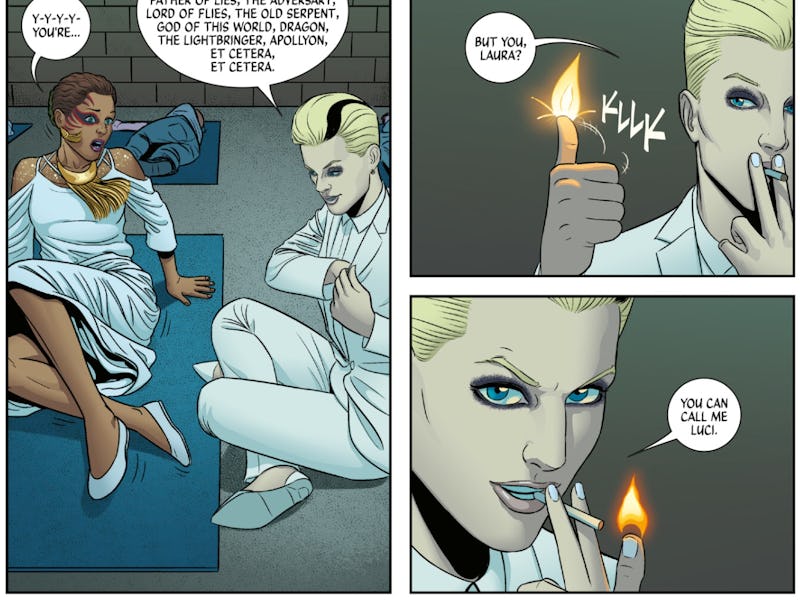'The Wicked and Divine' Might Be the Best Homage to David Bowie's Career
'The Wicked and the Divine' is fantastic on its own, but it carries extra meaning in the week of Bowie's death.

Lucifer dominates every page she’s on in The Wicked and the Divine. She’s all poise and attitude, half-knowing smile, half-sarcastic snarl, all white suit. The story is told from the point of view of the fangirl Laura, but the first five issues that comprise the opening story (and trade paperback) are Luci’s story, with her presence hovering over the panels she’s not part of.
It should also be noted that this initial WicDiv story is one of the best opening arcs to a comic I’ve ever read. It’s a perfect mix of author, artists, premise, and theme — with Lucifer as its gateway.
And it’s all David Bowie. Especially Lucifer. Just check her out:
Lucifer on the cover of 'The Wicked and the Divine'
The story of The Wicked and the Divine is this: every 90 years or so, roughly a dozen teenagers are granted the powers and personas of various gods from across the world. There’s Lucifer, Wodan, Baal, Amaterasu, and more. They become instant celebrities, have an entire culture built around them, as they struggle with their powers and the memories of who they were and the knowledge that this gift will kill them in two years.
So while Lucifer may be directly Bowie-inspired — something writer Kieron Gillen made implicitly clear in his Tumblr post saying goodbye to Bowie, and penciller Jamie McElvie said directly.
What ensues in the pages of WicDiv is a speculative fiction meditation on fame, power, identity, style, and sex, all very much in Bowie’s wheelhouse. It’s not Bowie fanfiction — Luci has a cruel streak that Bowie’s music never expressed thematically — but it feels like the sort of story Bowie might help create, or love to read.
WicDiv is also a great example of the potential of comics, especially the creator-driven comics of Image. Gillen’s script is all energetic plot combined with intelligent mythological reference and a clear love of inclusivity. Jamie MckElvie’s pencils are all huge, dramatic, larger-than-life expressions and faces, something that doesn’t entirely fit with superhero comics at times, but perfectly matches the over-the-top deity drama of The Wicked and the Divine. And Matt Wilson’s colors. The colors, children, the colors!
Don't mess with Luci.
This all makes The Wicked and the Divine not merely a great comic and a great homage to David Bowie and the themes of his career — it’s also a fine gateway into indie comics or the medium as a whole.